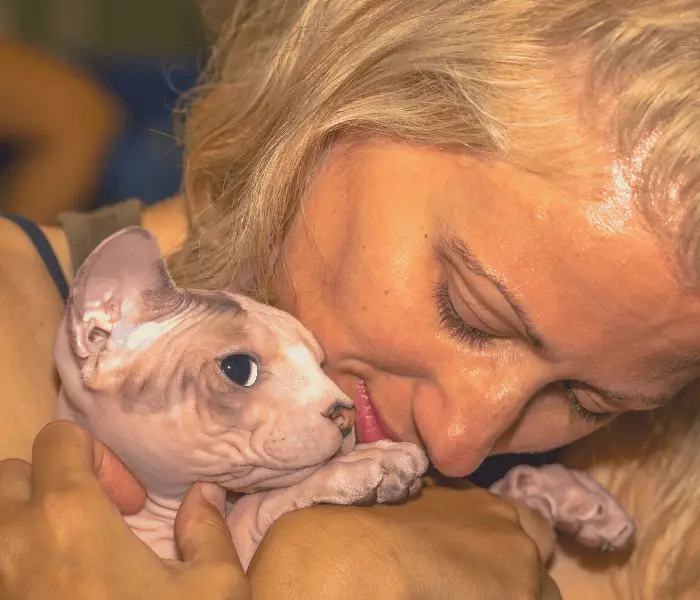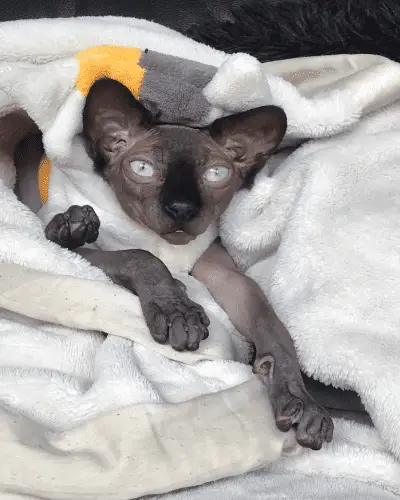Sphynx cats adore human attention, and this (along with their unique appearance) is the main reason the sphynx has been increasing in popularity over the past few years. In fact, the Cat Fancier’s Association in the US has reported a 50% increase in the number of registered sphynx kittens over the past five years.
Sphynx cats are incredibly affectionate and social; however, they may be aversed to being picked up and held by unfamiliar people. The degree to which a Sphynx enjoys being picked up and held is dependent on an individual Sphynx’s temperament. A Sphynx can be conditioned to tolerate human handling through positive affirmation.

One of my very first encounters with a Sphynx cat was when I was doing pet sitting as a vet student for extra money. It was in the middle of winter, and I had to feed and play with Skylar the Sphynx twice a day over a long weekend.
I found Skylar snuggling inside his plush ‘cat hamburger.’ He stared at me with his big yellow eyes as if saying, ‘excuse you for interrupting my nap!’. I was in awe of his sleek skin and the velvet-like fine hairs on his muzzle.
Impulsively, I reached out to stroke his smooth skin – with my icy cold wintery fingers. Skylar let out a soft, very unimpressed meow and, with disdain, got up to climb in his other cat hamburger in his owner’s bedroom – away from me and my cold hands.
I felt a jolt of guilt when I realized that that was the exact same response I got from my boyfriend (now husband) when I touched him with my wintery cold fingers (I now do it because I find it amusing when he squirms to get away from my cold hands).
Needless to say, I had to work hard to win Skylar over after my not-so-smooth first impression, and I’m sure I never completely won Skylar over, but I adored him nonetheless.
Sphynx Cats Are Velcro Cats
Sphynx cats are clingy beyond comparison to any other cat breed. They will often follow their owners around and choose to sit on their laps whenever possible. They are borderline obsessed with getting attention from their owners.
This is why it is not recommended to get a Sphynx if you know that you won’t be home most of the time or if you only want a single pet. If you are not working from home or know that you will have to leave the house for long periods, it is best to have more than one (Sphynx) cat so that they can keep each other company.
The Sphynx was rated the most affectionate cat breed in a 2012 Study Published in The Journal of Veterinary Behavior. There are many speculated reasons for this, including selectively breeding affectionate cats and the fact that Sphynxes are wholly dependent on humans for their every need.
Sphynx cats need humans to provide them with enough food (they have higher calorie requirements than furry cats) and to protect them from harsh environments (they have sensitive skin and no protection against sun and cold weather).
Sphynx cats will obviously not be able to fend for themselves in the wild, unlike other cats who are capable of living as feral cats.
Sphynx Cats Need To Get To Know You First
Like Skylar, most Sphynx cats are not immediately friendly to strangers; however, they have endless adoration for their owners and may even ‘wag’ their tails with joy when their owners come home (you can read more about the happy tail gestures of a sphynx here).
Sphynx cats are smart enough to not blatantly trust any human, but by spending some time with them, a sphynx will happily bond with the humans around them. This is a necessary prelude to picking up and holding any Sphynx.
Sphynx Cats Do Not Always Like To Be Picked Up
A cat can sometimes perceive being picked up by an unfamiliar human as dangerous since they don’t know whether the human might drop them or if the human will confine them against their will.
Also, if being picked up does not have a positive consequence, cats will tend to try and avoid being picked up. Similarly, if a cat was dropped unexpectedly after being picked up, they will be less inclined to tolerate being picked up the next time around.
Sphynx Cats Do Not Always Like To Be Held
Again, this is personality dependant, and many sphynx owners have found that one of their cats like being held while others refuse to be cuddled.
It also seems to be generally true that sphynx cats who were picked up and often held as kittens seem to enjoy cuddling more.
Conversely, kittens who were not handled often during their first 6-16 weeks (socialization period) seem more averse to handling as they grow older.
Sphynx Cats Like To Cuddle – But On Their Terms
Most sphynx cats enjoy cuddling (especially if it is cold – for obvious reasons). The caveat to this is that they often like to do this on their terms.
For example, when you go get your Sphynx to join you on the couch for an episode of your favorite series, they might not stay for long or even get up and wander off to do whatever cat duties they have going on. However, if your Sphynx decides to lie on your lap while you work on your computer at home, they might stay for hours.
It is true that a sphynx cat’s personality perhaps resembles the character of a dog more than it does that of a cat. But they are still cats, after all, and want to do things on their terms and on their own time.
Sphynx Cats Can Be Taught To Enjoy Being Picked Up And Held
The fantastic thing about cats and dogs is that we can teach or condition them to get used to doing something we enjoy. To achieve this, we need to reinforce an action by affirming it with something positive that we know our cats like, for example, a treat.
To teach you sphynx to be more willing to be picked up and held, start by picking them up, offering a treat, and then putting them back down again. Repeat this a few times over a few days until they come and ask to be picked up.
You can now start to increase the duration of cuddling and holding your cat before giving the treat. Eventually, you will not provide the treat every time you do this, and finally, you will stop giving the treat when picking up and holding your sphynx.
Of course, this method will not be equally as effective for all Sphynxes as some just generally like to be held more than others do.
Holding Your Sphynx Is Good For Your Health
It is no secret that owning a pet positively affects the mental health of stressed humans. As a result, the tongue-in-cheek prescription for a pet has increased substantially, especially since the pandemic’s start.
Because their skin temperature is a few degrees warmer than our own, it can be incredibly comforting to have a Sphynx sitting on your lap. Sphynx cats have even been used for pain relief for people suffering from arthritic or muscle pain associated with conditions such as multiple sclerosis or fibromyalgia.
In addition to this, cats, in general, have been shown to have the following effects on human health:
- Lower heart rate and blood pressure
- Decreased seasonal allergies and asthma (speak to your doctor before getting a cat if you have severe allergies or asthma)
- Lower rate of heart disease and stroke
- Lower rates of depression
If that is not enough reason to get a cat, I don’t know what is! The reward we get from owning a cat is way more far-reaching than having company when you are home alone.
Conclusion
Even If your Sphynx tries to squirm away when being picked up or jumps out of your arms as soon as you pick them up, they surely will enjoy cuddling- perhaps on their own terms!
Ensuring that being picked up and held is a positive experience every time you do it will help your sphynx get used to being picked up; however, this is highly personality dependant, and some Sphynx cats simply did not read the books on Sphynx breed characteristics. However, the cookie crumbles- we still love and adore their nakey butts!

Resouces
- Bahlig-Pieren, Z. and Turner, D., 1999. Anthropomorphic Interpretations and Ethological Descriptions of Dog and Cat Behavior by Lay People. Anthrozoös, [online] 12(4), pp.205-210. Available at: <https://www.tandfonline.com/doi/pdf/10.2752/089279399787000075?needAccess=true>.
- Bernstein, P.L. (2007). The Human-Cat Relationship. In: Rochlitz, I. (eds) The Welfare Of Cats. Animal Welfare, vol 3. Springer, Dordrecht. https://doi.org/10.1007/978-1-4020-3227-1_3
- Ellis, S., 2018. Recognising and assessing feline emotions during the consultation: History, body language, and behavior. Journal of Feline Medicine and Surgery, [online] 20(5), pp.445-456. Available at: <https://journals.sagepub.com/doi/abs/10.1177/1098612X18771206>.
- Jennings, L., 1997. Potential Benefits of Pet Ownership in Health Promotion. Journal of Holistic Nursing, [online] 15(4), pp.358-372. Available at: <https://journals.sagepub.com/doi/abs/10.1177/089801019701500404>.
- Mertens, C., 1991. Human-Cat Interactions in the Home Setting. Anthrozoös, [online] 4(4), pp.214-231. Available at: <https://www.tandfonline.com/doi/abs/10.2752/089279391787057062>.
- O’Farrell, V., Ross, C. and Neville, P., 1994. BSAVA Manual of feline behaviour. Cheltenham: British Small Animal Veterinary Association.
